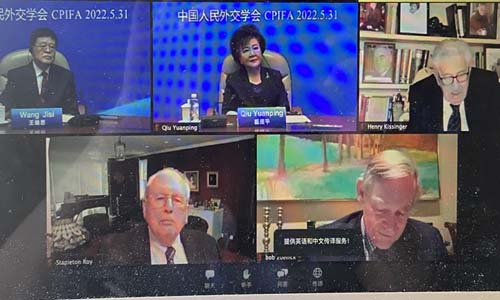
China-US relations far from normal, anxiety of the US completely unnecessary: Chinese FM
Xie Wenting and Bai Yunyi
Beijing: China’s State Councilor and Foreign Minister Wang Yi warned this week that China-US relations cannot continue to deteriorate and that right choices should be made.
Delivering a video speech at an online seminar on Kissinger and China-US relations hosted by the Chinese People’s Institute of Foreign Affairs on Tuesday, Wang pointed out that the current atmosphere in China-US relations is far from normal and the extreme anxiety exhibited by the US side is completely unnecessary.
“China’s overriding task is to concentrate on its own development and satisfy its people’s aspirations for a better life. If the US only defines its relations with China in terms of major-country competition and sets its policy goal on a win-lose basis, it will only push China and the US into confrontation and the world into division and turmoil,” Wang said.
Wang warned that if the US continues to backtrack on the Taiwan question, it will fundamentally undermine peace across the Taiwan Straits and will eventually hurt itself. He called for the consolidation of the political foundation and properly managing differences.
The seminar was also aimed at celebrating the 99th birthday of Henry Kissinger who was born on May 27, 1923. Half a century ago, Kissinger came to China to help break the ice between the two countries, opening a new chapter in China-US relations. Throughout his diplomatic life, Kissinger who once served as US Secretary of State, has been dedicated to advancing China-US relations.
At the beginning of seminar, participants recalled their encounters with Kissinger. Participants including former Chinese Ambassador to the US Cui Tiankai, former US Deputy Secretary of State Robert Zoellick, former US Ambassador to China Stapleton Roy, and President of the Council on Foreign Relations Richard Haass also shared their views on the current China-US relations.
Kissinger joined the online seminar on Tuesday. He recalled how efforts were made to overcome tensions to develop China-US relations on the basis of dialogue and cooperation and how the relationship once developed in a constructive direction.
He pointed out that compared to 50 years ago, the US and China now shoulder even greater responsibilities. As with the fast development of technology, conflict between great powers could lead to national and global destruction.
He called for each side to make efforts to start a dialogue by which they can fully understand the “core interests of the other side” and respect these concerns.
Kissinger recalled at Tuesday’s seminar that 50 years ago, it was based on a tacit understanding that the US would recognize the one-China principle and that China would understand and respect the concerns that America had about and how that principle would be implemented on the Chinese side.
He noted that some progress had been made in the first 50 years. But now as we face a world of different complexities and with different evolutions, it’s important to define for each other what we consider to be obstacles to progress and what we consider the goals we can achieve.

He said he hopes to define a code of co-existence for the two countries.
Ambassador Cui said at the seminar that it’s important to draw many useful lessons from the history of the past 50 years. He cautioned that a phenomenon worthy of vigilance is that some people are now completely denying it.
He gave an example that 50 years ago, the Asia-Pacific region was in turmoil and many innocent people were killed, while now the Asia-Pacific region as a whole is far more stable.
“The region may not be stable if some people’s plans succeed. But so far, it has been generally stable,” Cui said. He did not directly name the people with the intentions of destabilizing the Asia-Pacific region.
History has told us cooperation is the only correct choice. In the past couple of decades, the normalization and development of China-US relations has played an important role in the development of the Asia-Pacific region, he said.
“Since history has proved that this is the right path, why do some people want to go back and turn back the clock? Do they want to restore war, conflict, instability, poverty, division, mistrust, and instability to the region? I think we should all pay attention to it,” Cui said.
Haass said at the seminar that the challenge facing China-US relations is substantial. Obviously, diplomacy now is carried out in an age of different technologies, including social media, which don’t make things any easier.
“To some extent, geopolitical competition takes place in an era which is increasingly dominated by global issues like climate change or infectious disease. So the question will be can the US and China, despite their very different systems and competitive dimensions, still find areas in which to cooperate on issues where it’s in their mutual benefit to cooperate?” he said.
Other diplomats at the seminar also echoed Haass, calling for cooperation between the two countries and the necessity to manage differences.
